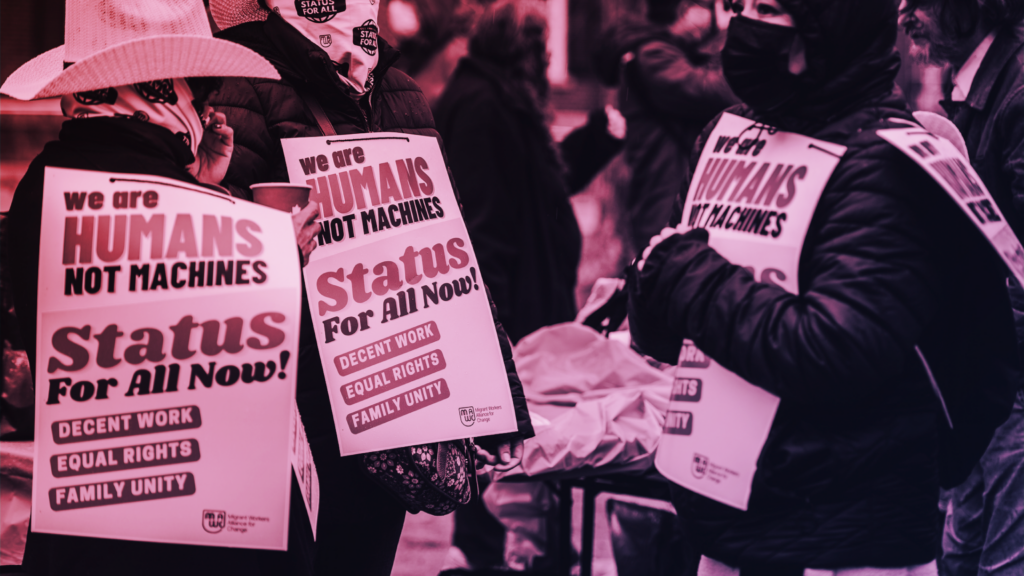
OFL STATEMENT
December 18, 2012
Canada’s Exploitation of Migrant Workers Lowers the Bar for Every Worker
OFL Statement for December 18, 2012 International Migrants Day
Only days before the international community celebrates International Migrants Day, Canada’s Conservative government quietly introduced new rules stripping migrant workers of benefits they pay for. On December 10, International Human Rights Day, special parental, maternal and compassionate benefits were eliminated for 30,000 seasonal agricultural workers even though they help to subsidize Canada’s Employment Insurance fund. Contrary to what many would consider to be Canadian values, these vulnerable workers will no longer be entitled to collect a fraction of their wages while caring for newborn or sick children. This policy is shamefully consistent with Canada’s recent history of exploiting migrant workers to lower the bar for all workers.
Established in 1990 through the United Nations International Convention on the Protection of the Rights of All Migrant Workers and Members of Their Families, December 18 is celebrated around the world as International Migrants Day. This day is an important opportunity to promote the labour rights, human rights and fundamental freedoms of migrants, many of whom are working internationally to overcome poverty, social conflict, human rights abuses and other forms of adversity to create a better life for their families.
Issues facing migrant workers has become the frequent subject of media reporting in recent years. After six weeks of disturbing news about the E-Coli contaminated meat crisis in the XL Meat Plant in Brooks, Alberta, many people were shocked to learn that 2,000 workers at the plant were migrant workers. Those foreign workers were working under temporary permits and all were laid off as a result of the crisis. Their precarious employment circumstances served to underline the vulnerability of migrant workers. In British Columbia, organized labour forced the Ministry of Human Resources to review the Temporary Foreign Workers Program when it was revealed that companies such as a subsidiary of Chinese Dehua Mines were exclusively soliciting Mandarin-speaking workers in an attempt to circumvent federal rules requiring them to locate and train Canadian workers.
“The Harper government is attempting to remodel the Canadian workforce around corporate interests by using global competition to drive down wages for all workers,” said OFL President Sid Ryan. “The intense emphasis on recruiting migrant workers in nearly every sector is a bold-faced attempt to exploit the most desperate and vulnerable workers while driving down wages across the board. Harper calls it a ‘flexible workforce’ but it is obvious that what he means is a ‘disposable workforce.’”
The omnibus Federal Budget Bill C-38, introduced early in 2012 made it legal to pay migrant workers in any industry up to 15 percent less than domestic workers. Furthermore, the Bill also introduced new requirements that could force Employment Insurance recipients to accept jobs posted through the Temporary Foreign Worker Program (TFWP), which would result in unemployed Canadian workers competing with foreign workers for jobs paying substandard wages. As the use of imported temporary labour is increasingly used to replace good jobs with decent wages and benefits, both migrant and domestic workers are bearing the brunt of austerity economic policies.
Recent data released by Citizenship and Immigration Canada reveals that the 250,000 permanent residents entering Canada on an annual basis is now being surpassed by over 280,000 migrant workers. This trend reflects a shift in immigration policy away from a model favouring permanent residency, which offers equal access to legal rights and a path to citizenship, to a heavy reliance on migrant workers who face low wages, uncertain immigration status and limited access to legal and labour rights.
While working in Canada, migrant workers are vulnerable to exploitation. They face control of their traveling documents, restriction in their physical mobility, employment tied to one employer and one contract, arbitrary repatriations and termination. For women working in the domestic sphere, exposure to violence, abuse and sexual exploitation may also be a daily reality. Migrant workers are too often exposed to long hours of work outside of the Employment Standards Act, precarious or unsafe working conditions, high levels of occupational accidents, discrimination, marginalization, isolation and social exclusion.
While the international community has begun to demand legal protections for migrant workers through International Labour Organization conventions and UN declarations, such as the 1990 International Convention on the Protection of the Rights of All Migrant Workers and Members of Their Families, Canada has too often refused to ratify these agreements or abide by international standards.
Finally, it should be noted that it is disproportionally women, refugees, individuals from racialized or displaced communities, and people of diverse sexual orientations and gender identities who are in situations of forced migration. Women alone make up half of the global migration flow worldwide. Often these migrant workers are abused by recruiters in the countries of their origin who charge excessive fees. Yet, overlooked by the governments and international agencies profiting from the current labour import policies is a debate about the root causes behind why people are forced to migrate. All of the key players in the sector – migrant workers, labour union, community organizations and provincial, federal, and international institutions – need to be engaged in a discussion about developing standards and enforcement mechanisms for fair practice in migrant and temporary foreign worker recruitment, employment and treatment.
“On International Migrants Day, Ontario’s labour movement is demanding respect for the rights of migrant workers, including the adoption, monitoring and enforcement of strong labour law protections and human rights legislation,” said Ryan. “Precarious, temporary and vulnerable working conditions cannot be tolerated for any worker, or else they risk becoming the norm for every worker. It is time that Canada became a leader in good jobs and reversed the race to the bottom.”
This December 18, the OFL is celebrating the valuable contribution that migrant workers and their families make to Canadian society by reaffirming its commitment to the defence of migrant workers rights. Ontario workers are calling for a radical shift in Canadian labour and immigration policies to entrench labour and human rights while promoting social and economic equality. The OFL will continue to work with community partners and build solidarity with other social movements in a common struggle for a more humane and inclusive Canada.
The Ontario Federation of Labour (OFL) represents 54 unions and one million workers in Ontario. For information, visit www.OFL.ca and follow the OFL on Facebook and Twitter: @OFLabour. Follow OFL President Sid Ryan on Twitter @SidRyan_OFL
For further information:
Joel Duff, OFL Communications Director: 416-707-0349 (cell) or jduff@ofl-org.flywheelsites.com *ENG/FRENCH*


